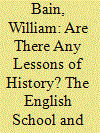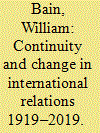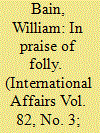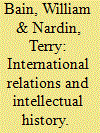| Srl | Item |
| 1 |
ID:
078484


|
|
|
|
|
| Publication |
2007.
|
| Summary/Abstract |
This article explores what English School theorists claim for history in the study of international relations. The writings of Hedley Bull and Herbert Butterfield are examined with a view to providing an idealized though coherent distillation of the place historical enquiry enjoys in English School theory. The limitations of their respective positions, which cannot fully sustain the English School claim that historical knowledge is important in understanding international relations, are addressed by turning to Michael Oakeshott's conception of history as fable. The article concludes by reaffirming the place English School theorists give to historically informed theory by, paradoxically, denying to history any didactic character and therefore any practical relevance. For it will become evident that a didactic history - and whatever lessons it offers - is an illusion made in the present for the present, which is neither historical nor instructive
|
|
|
|
|
|
|
|
|
|
|
|
|
|
|
|
| 2 |
ID:
167180


|
|
|
|
|
| Summary/Abstract |
This article reflects on themes of continuity and change over the past century of international relations. In 1919 the victors of the First World War endeavoured to remake international relations by abolishing war and erecting institutional structures that were intended to promote a more just world order. The achievements and failures of this project can be discerned in overlapping patterns of continuity and change that portray a world that is at once old and new. The discourse of change tends to dominate thinking about international relations. Technological innovation, globalisation, and human rights, among other factors, cultivate the progressive ‘one-worldism’ of an interconnected global community of nations and peoples. But, evidence of change notwithstanding, much of contemporary international relations would be intelligible to persons who lived a century ago. International relations is still fundamentally about order and security, power and restraint, and freedom and equality. These patterns provide an important reminder that progress is possible but that international relations involves an open-ended project of continuous renovation and conservation.
|
|
|
|
|
|
|
|
|
|
|
|
|
|
|
|
| 3 |
ID:
069775


|
|
|
| 4 |
ID:
155784


|
|
|
|
|
| Summary/Abstract |
The history of international thought has traditionally focused on a limited number of canonical texts. Such an approach now seems both naive and parochial. International Relations scholars often read their own ideas into these texts instead of getting ideas from them – ideas that if properly understood have the potential to undermine theirs. By ignoring non-canonical texts, we overlook resources that are not only necessary to establish the historical contexts of canonical writings but that can also help theorists of International Relations to understand their subject better. Judgements of what is and is not canonical are in any case themselves context-bound and contestable. Intellectual history can help us understand how the International Relations canon was constructed and for what purposes. It can also counter the abstractions of theory by reminding us not only that theories are abstractions from the activities of people living in particular times and places but also that our own theories are embedded in historicity. In these and other ways, paying attention to intellectual history expands the repertoire of ideas on which International Relations theorists can draw and against which they can measure their conclusions. The articles in this issue illustrate these points in relation to a wide range of texts and contexts. They suggest that whether one approaches international relations from the angle of description, explanation, policy or ethics, knowing how past thinkers have understood the subject can lead to better informed and more robust scholarship.
|
|
|
|
|
|
|
|
|
|
|
|
|
|
|
|